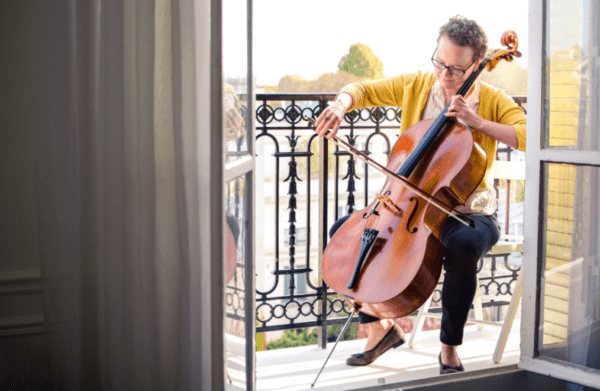As people around the world have adapted to changing times, Italians made music from their balconies. Auditory scientist Dr. Chi Yhun Lo explains how music has the power to connect us emotionally and shares tips to get started incorporating music into your life.
Italians have made headlines as they played music from their balconies as a way to unite and connect during quarantine measures to slow the spread of COVID-19.
As well as creating emotional connections, music plays other valuable roles and can benefit people with cochlear implants by enhancing listening skills, which can lead to improved communication and social wellbeing.
In this Q&A, Dr. Chi Yhun Lo (PhD)1, a researcher in the field of auditory training for people with hearing loss, explains how music connects people and can have added benefits for cochlear implant recipients. With many people now facing social distancing and staying at home, he also shares tips to help you reconnect with music.
Were you surprised to see people playing music from their balconies in Italy amid the COVID-19 pandemic?
“We are social beings and having to lock down and practice social-distancing is very unnatural and uncomfortable for most of us. Using novel ways to reach out and connect to others with the power of music is wonderful and a way for people to connect with each other.”
What role does music play in people’s lives?
“Music is the perfect medicine to help us reconnect and provide emotional sustenance during these isolating times. Sing, dance, laugh, and play!
Music helps us draw emotional connections between people and communities.”
What’s the role of music for people with cochlear implants?
“For cochlear implant recipients, there are specific benefits as music is an excellent tool that may also enhance listening skills—particularly around emotional prosody2 3 (e.g. the emotional aspects of speech that let us identify if someone is happy, scared, angry, etc.), which could have flow-on effects such as improved communication and wellbeing4.”
What can people with cochlear implants do at home to enjoy music?
“The number one tip is simply to start! Engage with music, whether that is listening to, or playing music. But here are five tips to consider:
- Start simple. Music is wide and varied, but try listening to music with less instruments/ musical elements, rather than more. If you enjoy classical music, start with quartets rather than orchestras. If you enjoy pop music, start with simple acoustic arrangements with prominent vocals.
- Listen to your favorite albums and songs. Even if it might not sound quite like you remember, use that memory to your advantage.
- Use imagery. Videos of musicians playing are a great way to use your eyes to help your ears.
- If you are going to start learning an instrument, I would recommend an instrument in which the notes are in visible order. For example, piano is a good start, as each key is a different note, with left to right corresponding with low (bass) to high (treble) notes.
- Apps are a great way to engage with music, as they can be used anywhere, anytime. For example,Cochlear’s Bring Back the Beat™ app is a fun way to get back into music.”
Try Cochlear’s new interactive music training tool, the Bring Back the Beat™ app designed to help you practice and reconnect to music. Download free now from: Apple® App Store5 or Google Play6 7.
- Dr. Chi Yhun Lo is a paid consultant to Cochlear Limited.
- Fuller CD, Galvin JJ, Maat B, Başkent D, Free RH. Comparison of two music training approaches on music and speech perception in Cochlear implant users. Trends Hear [Internet]. 2018 Jan–Dec [cited 2020 March 31]; 22: 1–22. Available from: https://doi.org/10.1177/2331216518765379
- Lo CY, McMahon CM, Looi V, Thompson WF. Melodic contour training and its effect on speech in noise, consonant discrimination, and prosody perception for Cochlear implant recipients. Behav Neurol [Special Issue] [Internet]. 2015 Sep 30 [cited 2020 March 31]: 1–10. Available from: https://doi.org/10.1155/2015/352869
- Dritsakis G, van Besouw RM, O’Meara A. Impact of music on the quality of life of cochlear implant users: a focus group study. Cochlear Implants Int [Internet]. 2017 Jul [cited 2020 March 31];18(4):207–15. Available from: https://doi.org/10.1080/14670100.2017.1303892
- Apple, the Apple logo, FaceTime, Made for iPad logo, Made for iPhone logo, Made for iPod logo, iPhone, iPad Pro, iPad Air, iPad mini, iPad and iPod touch are trademarks of Apple Inc., registered in the U.S. and other countries. App Store is a service mark of Apple Inc., registered in the U.S. and other countries.
- © 2020 Google Inc. All rights reserved. Google Play is a trademark of Google Inc.
- For complete smartphone compatibility information, please visit our website.
